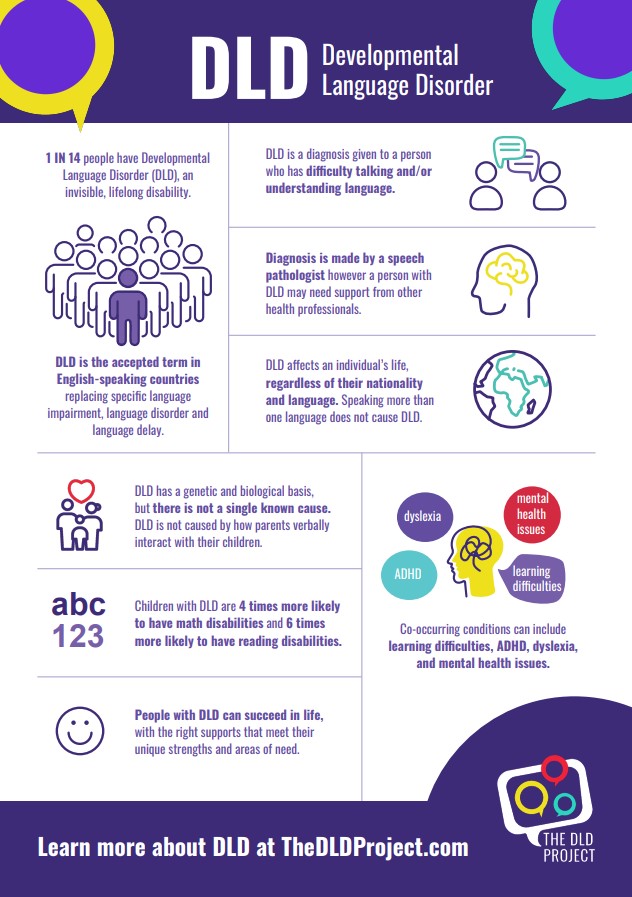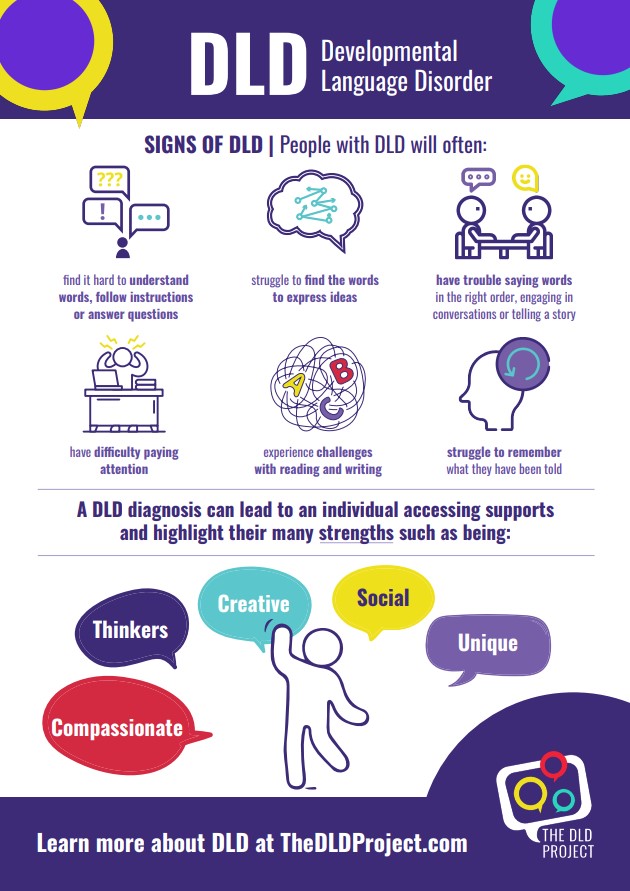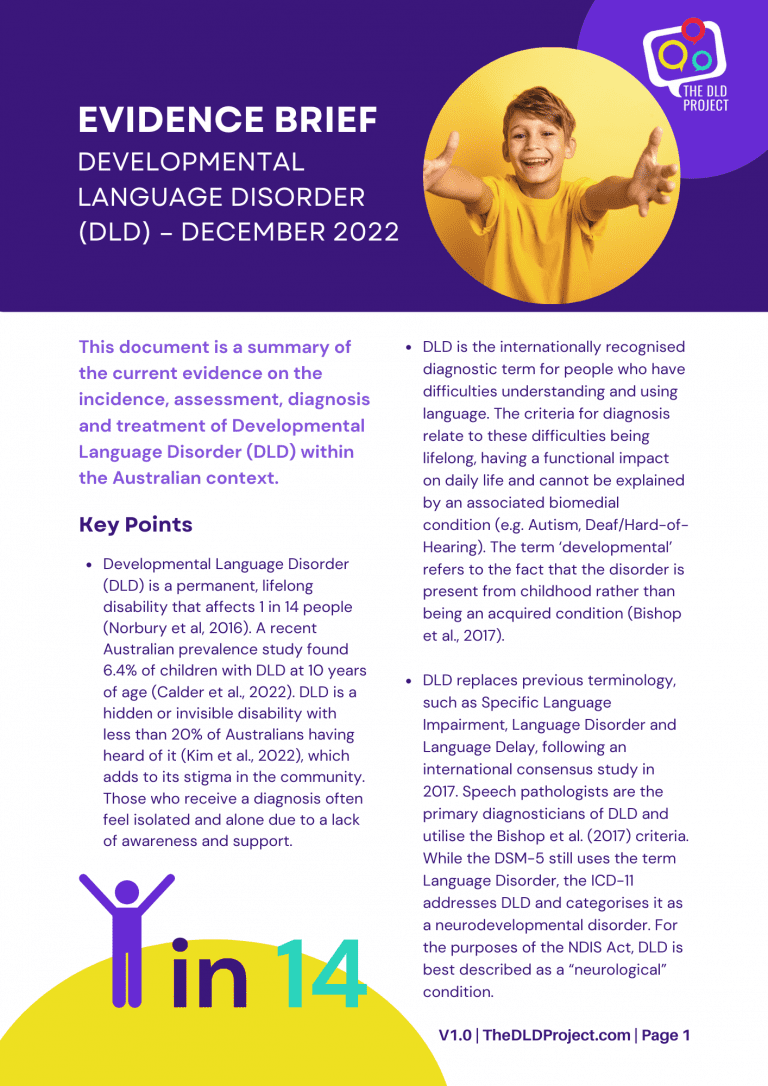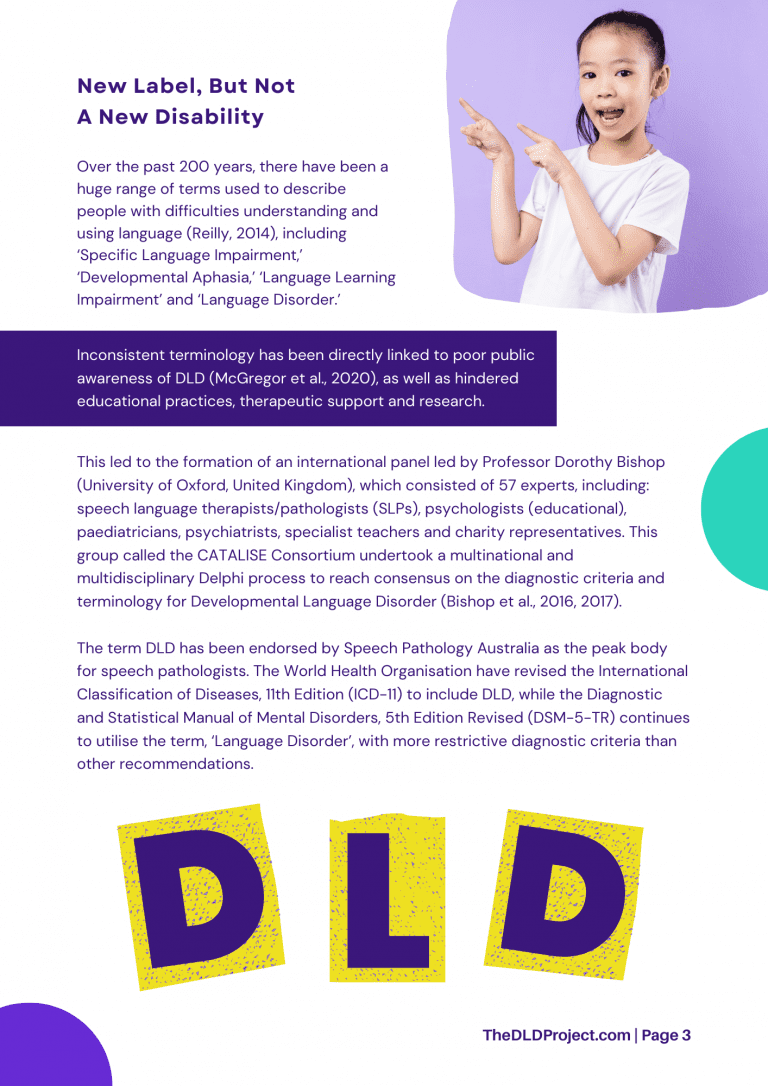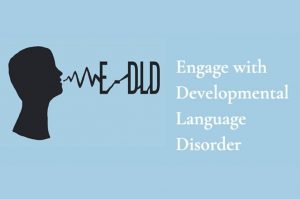Developmental Language Disorder (DLD) Information
You’ve probably heard about autism and dyslexia but not many Australians have heard of Developmental Language Disorder (DLD). With 1 in 14 people having DLD, it is time we talk more about this hidden but common lifelong condition.
DLD causes difficulties with speaking and understanding for no known reason. There are serious and long-term impacts, as it puts children at greater risk of failing at school and struggling with mental health and future employment. The biggest challenge with DLD is you can’t tell by looking at a person that they have DLD and therefore, DLD individuals often get overlooked for support.
People with Developmental Language Disorder can be as different as you and I. However, it is important to know that with the right supports, DLD individuals can thrive!
Know the facts about DEVELOPMENTAL LANGUAGE DISORDER (DLD)
- DLD is a brain difference that makes talking and listening difficult. It is 50 times more prevalent than hearing impairment and five times more prevalent than autism. (McGregor, 2020)
- The disability affects 7.5% of grade 1 children. Teachers, need to know about this hidden but common disability because, in a class of 30, two children will have DLD (Norbury et al., 2016)
- People with DLD are six times more likely to have reading difficulties and four times more likely to struggle with math. (Young et al., 2002)
- The condition tends to run in families. Twin studies indicate a strong genetic influence on DLD, but this seems to reflect the combined impact of many genes, rather than a specific mutation (Bishop, 2006).
- The popular view the disability is caused by parents who don’t talk to their children has no evidence-based support.
What are the signs of DLD?

DLD is when a person has difficulties understanding and/or using language. These difficulties do not occur for any known reason (e.g. head injury, hearing loss). DLD starts in childhood, but some people will be diagnosed as teenagers or adults. So, it is important to know the signs of DLD.
A person with DLD can have difficulties understanding what is said to them (receptive language) and speaking to others (expressive language). These language difficulties will be present throughout their life and impact their daily life at home, school or work. DLD can vary from person to person. Their needs will be different depending on age and the types of difficulties they have with language.
Some of the signs of DLD include:
- Starting to talk later than their siblings or peers
- Difficulties learning new words
- Struggling to put words into sentences
- Using the wrong words or leaving words out when speaking
- Using short, simple sentences
- Difficulties telling a story in order and leaving out details
- Difficulties answering questions
- Struggling to be understood by people outside their family
- Struggling to explain their thoughts and feelings
- Finding it hard to follow instructions
- Needing lots of repetitions to follow instructions
- Watching their peers to find out what to do rather than following instructions
- Difficulties learning and remembering new information
- Appearing to not be listening or distracted
- Becoming frustrated and using behaviours that can be challenging
- Difficulties learning to read and write
- Avoiding conversations and social situations
- Struggling to join activities and discussions
A person with DLD may struggle to follow instructions (i.e. “Before you get your English book out, put your pencil case on the desk”) and use shorter and simpler sentences when speaking (i.e. “She kick ball” instead of “She kicked the ball”). They may also present with other co-occurring difficulties such as dyslexia, ADHD, dysgraphia, dyscalculia and developmental coordination disorder/dyspraxia. This can put a student with DLD at serious risk of struggling with mental health or being bullied, as well as having an increased likelihood to struggle at school if supports are not in place.
How is DLD diagnosed?
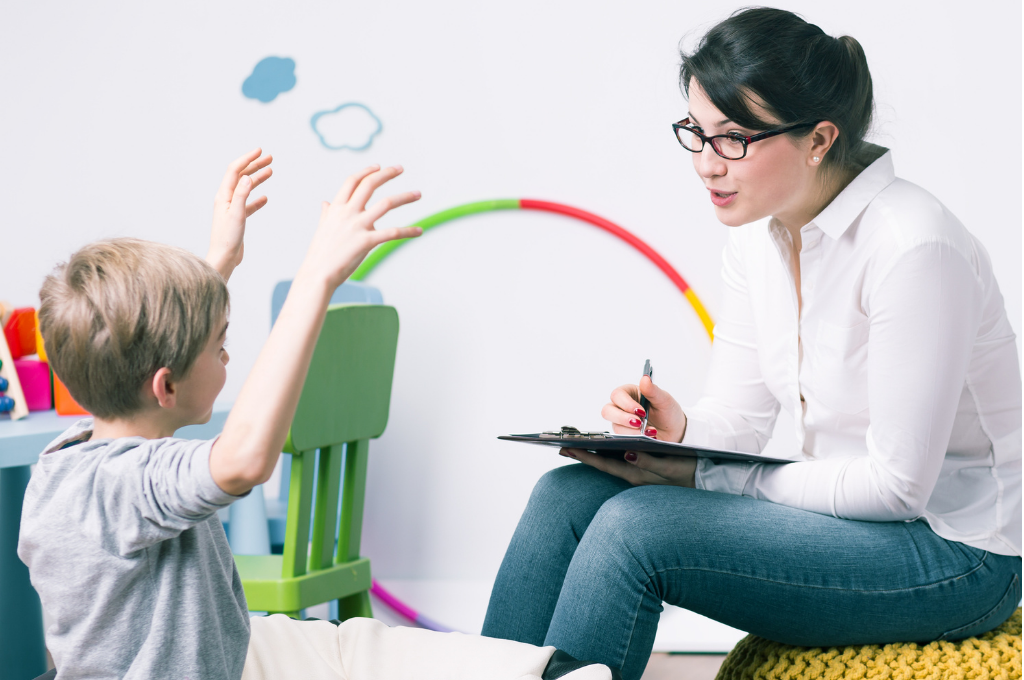
DLD is diagnosed by a speech pathologist. Speech pathologists are university educated health professionals who specialise is supporting people’s communication and swallowing throughout their lives. The person with language difficulties or a family member will complete a case history. They will also undertake observations and participate in assessments. There is currently no blood test, body scan or genetic analysis that can identify DLD. A diagnosis will be provided when:
- The person’s language skills are lower than would be expected for their age.
- The language difficulties are persistent and have not resolved by 5 years of age.
- The language difficulties are having a functional impact on the person’s life (e.g. learning at school, participating at work).
The term DLD is used when a person’s language difficulties are not due to another condition, such as a genetic syndrome (e.g. Down Syndrome), hearing loss, neurological disease, autism or intellectual disability. These are considered to be ‘differentiating conditions’ that impact on language development. These conditions do not need to be ruled to diagnose DLD.
Difficulties in learning, motor or behaviour can co-occur with DLD. These co- conditions include:
- Anxiety and depression
- Attention Deficit Hyperactivity Disorder (ADHD)
- Behavioural and emotional disorders
- Developmental Coordination Disorder
- Dyslexia/dysgraphia/dyscalculia
- Speech Sound Disorders
Can you diagnose DLD under the age of 5?
Language can change a lot in the first 5 years of life. Some children who have difficulties at 2 might be doing well by 5, while others may still need support. This means speech pathologists may not officially diagnose DLD before 5 years of age. Speech pathologists might use terms like language difficulties, language delay or provide a provisional diagnosis of DLD.
Some children might be considered a ‘late talker’. By 3 years of age, children should:
- have a vocabulary of more than 50 words
- communicate using two- and three-word sentences regularly
- understand short sentences spoken by adults.
You can learn more about communication milestones by reading the Communications Milestones Toolkit resource by Speech Pathology Australia.
If a child has not achieved these milestones, they may be a late talker. Almost half of ‘late talkers’ will catch up with their peers, but some may have DLD. Late talking is one factor used to help identify children under the age of 5 who might have DLD.
DLD may be diagnosed in children under the age of 5 if the speech pathologist believes the language difficulties are likely to persist and impact the child on a daily basis.
When should you seek help if you think that you or someone you know has DLD?
Contact a speech pathologist if you or someone you know is struggling to understand and use language (see ‘Signs of DLD’). A speech pathologist can determine if language difficulties are persistent and impacting a person on a daily basis. They can also help support the person and/or family to identify goals to help support them. Seeking help as soon as possible can make a big difference in a person’s life.
What can you do to support a student with DLD?

- Firstly, it’s important to remember students with DLD are very capable of achieving at school with the right supports in place. We hear from children with DLD that they often feel invisible and misunderstood in the classroom. They also report feeling that their abilities are grossly underestimated.
- With this in mind we recommend a person is assessed by a speech pathologist as soon as possible if they present with:
- obvious difficulties with speech, language or communication
- challenging behaviour
- departures from typical development in other areas of growth or learning (e.g. motor) in under 5 year olds
- persistent difficulties with understanding and/or using language.
If you don’t have a speech pathologist at your school, try Speech Pathology Australia’s Find a Speech Pathologist page or Google ‘speech pathology services near me’. You can self-refer to many speech pathology services, but you may also like to speak to your GP who may be able to help you access a Chronic Disease Management plan through Medicare. Write down your concerns about the child’s language, literacy and learning to share with the speech pathologist.
We highly recommend that families, educators and clinicians interested in supporting students with DLD complete our FREE On Demand online course What is Language + What is DLD.
Grow your skills & knowledge with us
Have you just received a Developmental Language Disorder (DLD) diagnosis and are now wondering what it means for your family? Or are you a therapist or educator looking to sharpen your skills and understanding of DLD? Our expert trainers have decades of experience working directly with people with DLD to empower them to thrive. Our training is evidence-based and practical to ensure you can apply your learnings in various settings. We provide pre-recorded online courses, in addition, to live interactive workshops that you can access online or in person.
Click here for our latest training opportunitiesParker's Journey to a DLD Diagnosis
15-year-old Parker lives in Brisbane, is an amazing photographer with nearly 4000 followers on his Instagram (@PHLPhotos) and he has Developmental Language Disorder.
Despite originally being diagnosed with dyslexia in Grade 3 Parker continued to have difficulties at school that were not totally explained by dyslexia which led to a diagnosis of DLD in early 2020.
“It’s not that you’re not listening or paying attention. DLD feels like everything is going over my head all the time. When I talk, it feels a bit like I’m about to stutter. Everything rushes to your mouth at once. I have to stop the sentence and restart or move onto something else. My mates don’t really notice, but I do,” he shared.
Having a label has been life-changing for Parker. It explains why he finds it difficult to understand when a teacher gives him an instruction and why he finds it hard to concentrate with his mind often going blank. Parker wants people to know that having DLD doesn’t mean you are ‘lazy’ or ‘stupid’. Just like him, the 1 in 14 people with DLD are working incredibly hard to keep up with what’s going on around them.
“Knowing you have DLD means you don’t beat yourself up over it. People need to be patient and not get frustrated.”
Parker speaks adamantly about the importance of not being singled out. He doesn’t want to be treated differently.
“It’s ok to have DLD. You can’t get rid of it. We need more awareness of DLD. More people with DLD telling their story to let people know about it.”
You can listen to Parker share his experiences on The Talking DLD Podcast here.
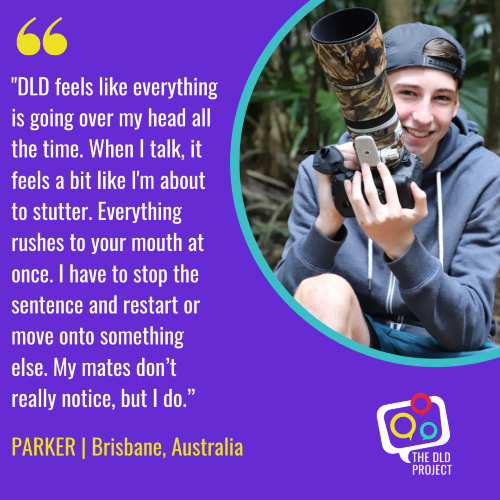
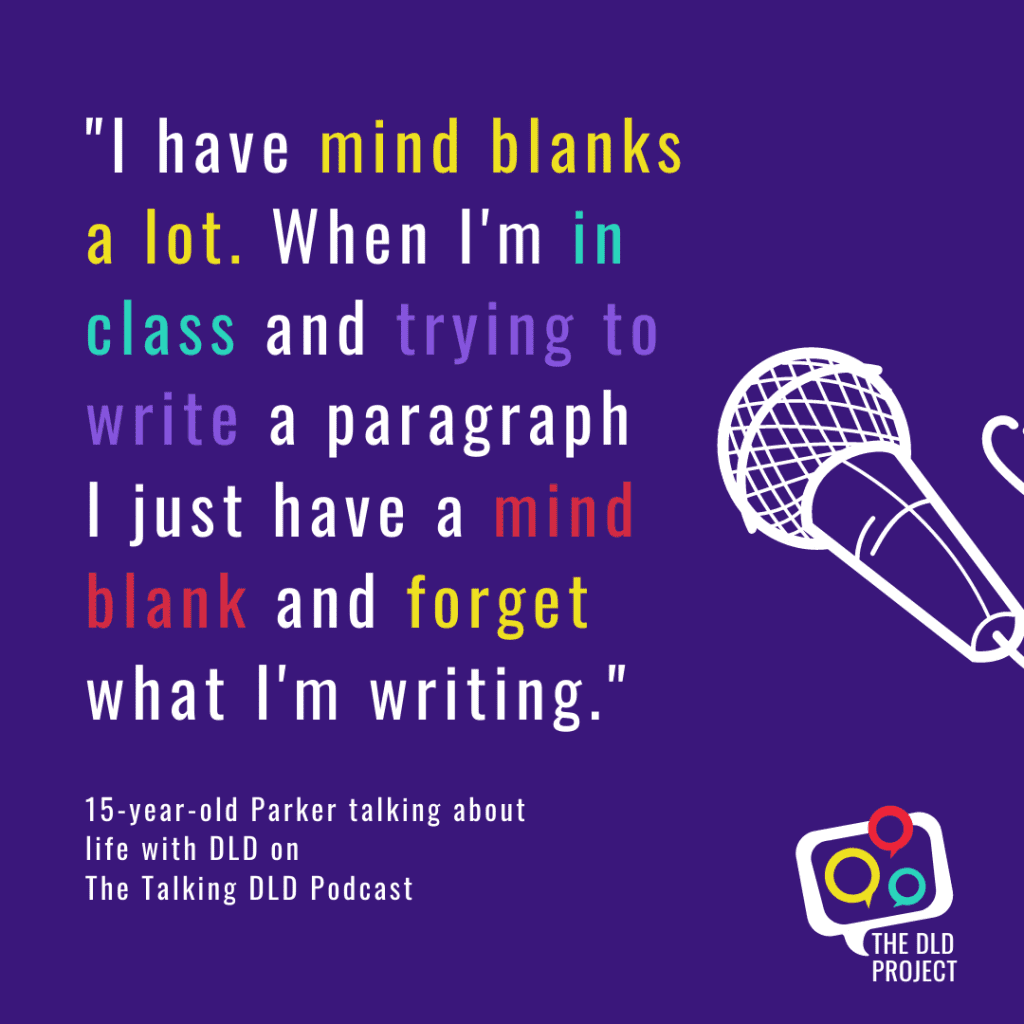
DLD | The StatISTICS
DLD affects 7.5% of grade 1 children. Teachers, need to know about DLD, because there are two students with DLD in every classroom. In a class of 30, 2 children have DLD.
Norbury et al., 2016
DLD is 50 times more prevalent than hearing impairment and 5 times more prevalent than autism.
McGregor., 2020
dldandme.org
People with DLD are 6 times more likely to have reading difficulties and 4 times more likely to struggle with math.
Young et al., 2002
DLD commonly co-occurs with other neurodevelopmental conditions such as ADHD, Developmental Coordination Disorder, dyslexia, and dyscalculia.
Cleaton & Kirby, 2018
4 out of 5 children with identified emotional and behavioural problems may have unidentified DLD.
Hollo et al., 2014; Benner et al., 200
DLD is unidentified in many affected children. Children with DLD often do not receive specialised services to address the condition.
Tomblin et al., 1997; Norbury et al., 2016
How did the term Developmental Language Disorder (DLD) come about?
Developmental Language Disorder (DLD) is the new term to replace Specific Language Impairment (SLI). Developmental Language Disorder is diagnosed when children fail to acquire their own language for no obvious reason. In 2017, a group of 59 experts—most, but not all, of whom were speech pathologists—from six different English speaking countries (29 from the United Kingdom, seven from the United States, eight from Canada, six from Australia, four from New Zealand, and three from Ireland) participated in a consensus-building exercise aimed at identification criteria and terminology. The group were called the CATALISE group (Bishop, Snowling, Thompson, Greenhalgh, & CATALISE Consortium, 2016; Bishop, Snowling, Thompson, Greenhalgh, & CATALISE-2 Consortium, 2017).
The group recommended that the term Developmental Language Disorder (DLD) be used to refer to neurodevelopmental language deficit.
DLD SUPPORT & ADVOCACY GROUPS
Australia
Developmental Language Disorder Australia Facebook Page
An Australian parent-led support and advocacy page for children and families living with Developmental Language Disorder (DLD).
INternational
Developmental Language Disorder (formerly SLI) Support
This is primarily a UK group for people affected by a DLD (formerly SLI) diagnosis but offers support to those without a diagnosis but a similar profile of ability. It may include discussion on co morbid conditions, other overlapping neuro diverse conditions, social, emotional and behavioural issues and other related challenges such as academic difficulties.
Developmental Language Disorder (formerly SLI) Support
This is a predominately UK based group where people can share resources/ information/ organisations related to Developmental Language Disorder (DLD) and most importantly actively help raise awareness in the UK for children and adults with the disorder. The group is for parents or carers of a child with DLD or an adult with DLD /speech & language therapist/teacher who works with children with DLD or a teacher who wants to learn more about this.
Organisations with expertise in DLD
Australia
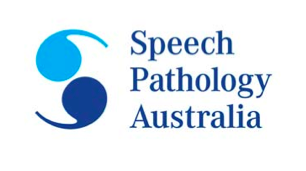
Speech Pathology Australia
Speech Pathology Australia is the national peak body for the speech pathology profession in Australia. You can search their website to find qualified Speech Pathologists in your area. They also advocate on behalf of people with DLD.
International

RAISING AWARENESS OF DEVELOPMENTAL LANGUAGE DISORDER (RADLD)
The RADLD movement is coordinated by international volunteers, including Shaun & Nat (Co-Founders of The DLD Project), with the mission to foster a substantial increase in international awareness of DLD. They coordinate the roll out of DLD Awareness Day in October each year and also provide extensive resources translated into more than 20 languages including videos.
Engage with Developmental Language Disorder
Engage with Developmental Language Disorder (E-DLD) connects people experiencing DLD to academic research. E-DLD want to see a world where DLD is fully understood by families and professionals.
They aim to keep families and individuals updated on:
– Research findings
– Current research projects
– Host online meet and share experiences
E-DLD supports researchers and other professionals working to improve outcomes for people with DLD. Our work helps with research and policy decisions.

AFASIC
A parent led organisation to help children and young people with speech and language impairments and their families in the UK.
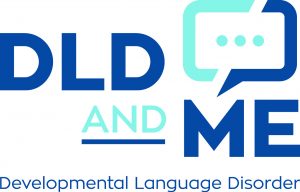
DLD & Me
This US website was created by collaborators from several institutions. Their goal is to raise awareness about Developmental Language Disorder (DLD) and to offer support and resources for parents, teachers and individuals impacted by DLD.
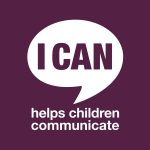
I Can
I CAN is a communication charity in the UK. They offer practical help for parents, run outreach programs, provide training and intervention.

NAPLIC
NAPLIC is a charitable organisation of teachers, speech and language therapists and other professionals in the UK.
Schools with specialist DLD Programs
Australia
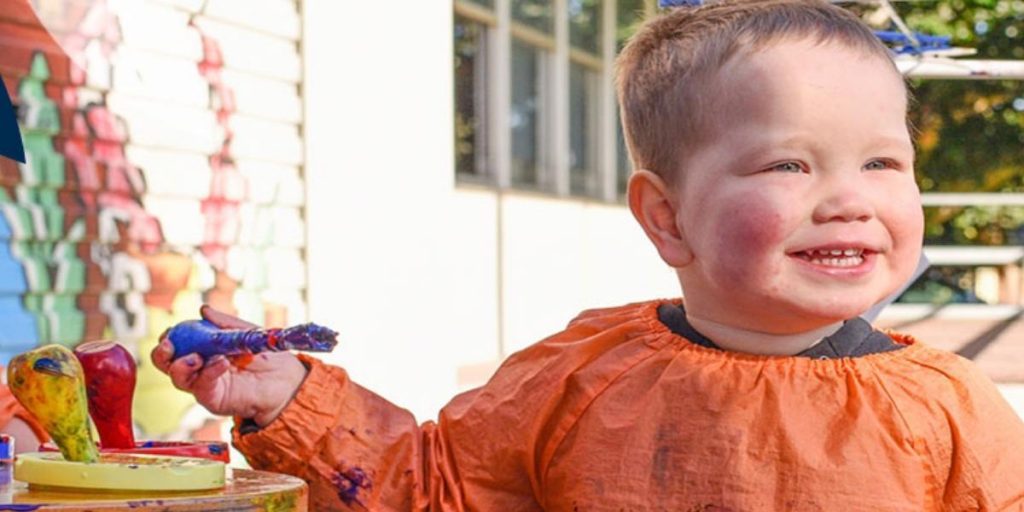
Language Development Centres - WA
For Children in Kindergarten – Year 1 with suspected Developmental Language Disorder.
The Language Development Centres (LDCs) provide intensive support for students whose academic and social performance is seriously limited by disordered speech and language development.
International
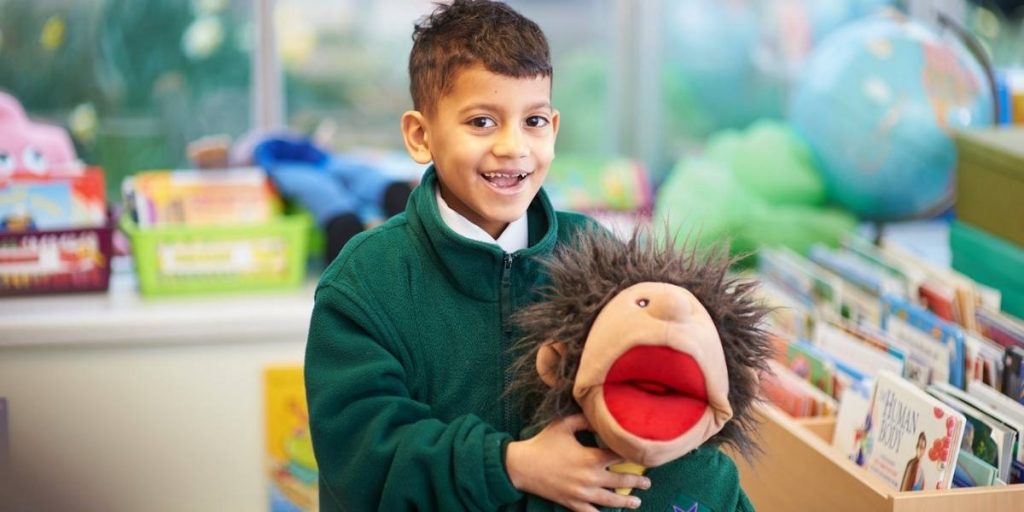
MOOR HOUSE SCHOOL & COLLEGE - UK
For students aged 7 to 19 years with language disorders and/or speech disorders
Moor House School & College is a highly specialist educational placement which provides individualised, targeted, and specialist education to children who have significant and pervasive language disorders and/or speech disorders with average learning potential.
DLD Research Articles
Australia
PREDICTING LANGUAGE OUTCOMES AT 4 YEARS OF AGE: FINDINGS FROM EARLY LANGUAGE IN VICTORIA STUDY
Reilly, S., Wake, M., Ukoumunne, O. C., Bavin, E., Prior, M., Cini, E., Bretherton, L. (2010).
International
CATALISE: A MULTINATIONAL AND MULTIDISCIPLINARY DELPHI CONSENSUS STUDY. IDENTIFYING LANGUAGE IMPAIRMENTS IN CHILDREN
Bishop D.V.M., Snowling M.J., Thompson P.A., Greenhalgh T. & the CATALISE consortium (2016)
PHASE 2 OF CATALISE: A MULTINATIONAL AND MULTIDISCIPLINARY DELPHI CONSENSUS STUDY OF PROBLEMS WITH LANGUAGE DEVELOPMENT: TERMINOLOGY
Bishop, D. V.M., Snowling, M. J., Thompson, P. A., Greenhalgh, T. & the CATALISE-2 Consortium (2017)
WHICH NEURODEVELOPMENTAL DISORDERS GET RESEARCHED AND WHY?
Bishop, D. V.M., Snowling, M. J., Thompson, P. A., Greenhalgh, T. & the CATALISE-2 Consortium (2017)
WHY IS IT SO HARD TO REACH AGREEMENT ON TERMINOLOGY? THE CASE OF DEVELOPMENTAL LANGUAGE DISORDER (DLD).
Bishop, D. V. M. (2017).
SPECIFIC LANGUAGE IMPAIRMENT: A CONVENIENT LABEL FOR WHOM?
Reilly, S., Tomblin, B., Law, J., McKean, C., Mensah, F. K., Morgan, A., …Wake, M. (2014).
LEVERS FOR LANGUAGE GROWTH: CHARACTERISTICS AND PREDICTORS OF LANGUAGE TRAJECTORIES BETWEEN 4 AND 7 YEARS
McKean, C., Mensah, F. K., Eadie, P., Bavin, E. L., Bretherton, L., Cini, E., & Reilly, S. (2015).
LANGUAGE OUTCOMES AT 7 YEARS: EARLY PREDICTORS AND CO-OCCURRING DIFFICULTIES
McKean, C., Reilly, S., Bavin, E. L., Bretherton, L., Cini, E., Conway, L., Wake, M. (2017).
DEPRESSION AND ANXIETY CHANGE FROM ADOLESCENCE TO ADULTHOOD IN INDIVIDUALS WITH AND WITHOUT LANGUAGE IMPAIRMENT
Botting, N., Toseeb, U., Pickles, A., Durkin, K. & Conti-Ramsden G. (2016)
CONDUCT PROBLEMS CO-OCCUR WITH HYPERACTIVITY IN CHILDREN WITH LANGUAGE IMPAIRMENT: A LONGITUDINAL STUDY FROM CHILDHOOD TO ADOLESCENCE
Pickles, A., Durkin, K., Mok, P. L., Toseeb, U., & Conti-Ramsden, G. (2016).
THE IMPACT OF NONVERBAL ABILITY ON PREVALENCE AND CLINICAL PRESENTATION OF LANGUAGE DISORDER: EVIDENCE FROM A POPULATION STUDY
Norbury, C. F., Gooch, D. , Wray, C. , Baird, G. , Charman, T. , Simonoff, E. , Vamvakas, G. & Pickles, A. (2016)
IMPROVING LANGUAGE COMPREHENSION IN PRESCHOOL CHILDREN WITH LANGUAGE DIFFICULTIES: A CLUSTER RANDOMIZED TRIAL
Hagen, Å. M., Melby‐Lervåg, M. & Lervåg, A. (2017)
LANGUAGE GROWTH IN CHILDREN WITH HETEROGENEOUS LANGUAGE DISORDERS: A POPULATION STUDY
Norbury, C. F., Vamvakas, G. , Gooch, D. , Baird, G. , Charman, T. , Simonoff, E. & Pickles, A. (2017)
SLP-EDUCATOR CLASSROOM COLLABORATION: A REVIEW TO INFORM REASON-BASED PRACTICE
Archibald, L.M.D. (2017)
UNDERSTANDING DEVELOPMENTAL LANGUAGE DISORDER - THE HELSINKI LONGITUDINAL SLI STUDY (HELSLI): A STUDY PROTOCOL
Laasonen, M. et al., (2018)
UNDERSTANDING DYSLEXIA IN THE CONTEXT OF DEVELOPMENTAL LANGUAGE DISORDERS
Adlof, S.M. & Hogan, T.P. (2018).

